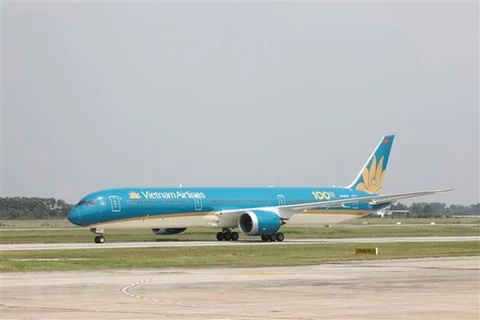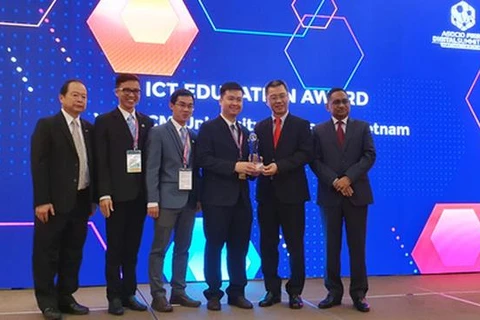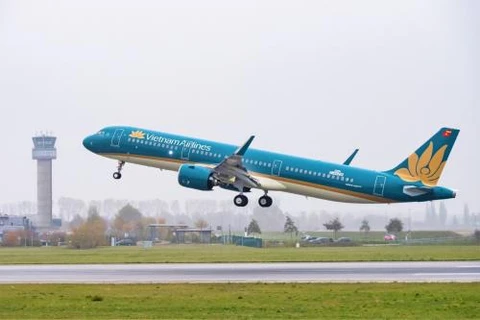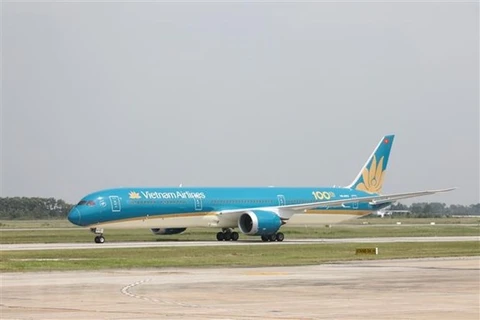Hanoi (VNS/VNA) - National flag carrier Vietnam Airlines has won the 2019 ICT Award from the Asian-Oceania Computing Industry Organisation (ASOCIO) for its outstanding achievements and important contributions to the development and application of information technology in operation and services.
The carrier was the only Vietnamese enterprise to be honoured at the ASOCIO ICT Awards, which were presented at the ASOCIO-PIKOM Digital Summit in Kuala Lumpur, Malaysia, last week.
The ASOCIO ICT Awards are leading prestigious information technology awards, with great influence in the region of 24 member economies. This year marks continuous efforts by Vietnam Airlines to become a digital airline.
Digital airline
In order to become a digital airline, Vietnam Airlines has continuously promoted the application of information technology in its operation and business activities, enhancing the customer experience and perfecting four-star services, while proceeding to five star.
CEO of Vietnam Airlines Duong Tri Thanh said the ICT infrastructure in Vietnam had witnessed a lot of positive changes in recent years, which helped the carrier digitalise flight management documents, apply artificial intelligence (AI) and use Big Data in business, operations and fleet management, enhancing automation and customisation to enhance the customer experience.
“Vietnam Airlines has been co-operating with many information technology giants to improve its infrastructure and make comprehensive transformations, helping it to become a digital airline in 2020,” Thanh said.
Thanh said Vietnam Airlines was the first Vietnamese airline to have completed phase 1 of the Skywise open data platform developed by Airbus and its Big Data partner Palantir.
“Skywise is considered the ‘heart’ of the digital revolution in the aviation industry,” Thanh said.
Skywise is the first-of-its-kind open data platform developed by Airbus for the aviation industry. By making the right information available at the right time, Skywise provides invaluable insights from the massive amounts of data that was previously locked in corporate and functional silos.
In terms of market research, Vietnam Airlines has been applying cloud computing designed by Oracle, which deploys flight analysis systems effectively, and a data analysis system on the Salesforce’s cloud platform to make market analysis and trade reporting.
For aircraft maintenance, the carrier has digitised and applied the management of materials, equipment, and aircraft maintenance and repair according to international standards (Best Practice), especially for new-generation aircraft such as the Boeing 787 and Airbus A350.
“Besides, the flight exploitation area has made great strides when applying electronic documents and e-flight folders for flight attendants since 2016, helping crews easily access information about meteorology, weather, technology and fuel with just a tablet, no need to bring a whole folder of paper documents as before,” Thanh said.
This year, Vietnam Airlines also launched a completely new version of its mobile application with many modern features, enabling passengers to quickly search for flights and itineraries, book tickets online, and use digital map positioning at nine domestic airports and 58 international airports.
Vietnam Airlines has recently applied onboard wifi on a number of A350 aircraft flights, becoming the first airline in Vietnam to offer wifi to passengers.
This is an exciting step for the flag carrier towards embedding digital technology in its products and services to enhance customer experience, reaching closer towards international 5-star quality standards while becoming a digital airline.
“With the goal of becoming a digital airline, Vietnam Airlines continues to take the lead in adopting information technology to bring customers added services. By providing the first in-flight wifi service in Vietnam, we hope to bring passengers a brand-new experience and convenience by allowing internet access during flights,” said Executive Vice President of Vietnam Airlines Le Hong Ha.
“Vietnam Airlines will continue to expedite upgrades to its services on other flights, as well as further invest in advanced technologies and the development of high-quality products and services, all to provide the most enjoyable experience possible for passengers,” Ha added./.
The carrier was the only Vietnamese enterprise to be honoured at the ASOCIO ICT Awards, which were presented at the ASOCIO-PIKOM Digital Summit in Kuala Lumpur, Malaysia, last week.
The ASOCIO ICT Awards are leading prestigious information technology awards, with great influence in the region of 24 member economies. This year marks continuous efforts by Vietnam Airlines to become a digital airline.
Digital airline
In order to become a digital airline, Vietnam Airlines has continuously promoted the application of information technology in its operation and business activities, enhancing the customer experience and perfecting four-star services, while proceeding to five star.
CEO of Vietnam Airlines Duong Tri Thanh said the ICT infrastructure in Vietnam had witnessed a lot of positive changes in recent years, which helped the carrier digitalise flight management documents, apply artificial intelligence (AI) and use Big Data in business, operations and fleet management, enhancing automation and customisation to enhance the customer experience.
“Vietnam Airlines has been co-operating with many information technology giants to improve its infrastructure and make comprehensive transformations, helping it to become a digital airline in 2020,” Thanh said.
Thanh said Vietnam Airlines was the first Vietnamese airline to have completed phase 1 of the Skywise open data platform developed by Airbus and its Big Data partner Palantir.
“Skywise is considered the ‘heart’ of the digital revolution in the aviation industry,” Thanh said.
Skywise is the first-of-its-kind open data platform developed by Airbus for the aviation industry. By making the right information available at the right time, Skywise provides invaluable insights from the massive amounts of data that was previously locked in corporate and functional silos.
In terms of market research, Vietnam Airlines has been applying cloud computing designed by Oracle, which deploys flight analysis systems effectively, and a data analysis system on the Salesforce’s cloud platform to make market analysis and trade reporting.
For aircraft maintenance, the carrier has digitised and applied the management of materials, equipment, and aircraft maintenance and repair according to international standards (Best Practice), especially for new-generation aircraft such as the Boeing 787 and Airbus A350.
“Besides, the flight exploitation area has made great strides when applying electronic documents and e-flight folders for flight attendants since 2016, helping crews easily access information about meteorology, weather, technology and fuel with just a tablet, no need to bring a whole folder of paper documents as before,” Thanh said.
This year, Vietnam Airlines also launched a completely new version of its mobile application with many modern features, enabling passengers to quickly search for flights and itineraries, book tickets online, and use digital map positioning at nine domestic airports and 58 international airports.
Vietnam Airlines has recently applied onboard wifi on a number of A350 aircraft flights, becoming the first airline in Vietnam to offer wifi to passengers.
This is an exciting step for the flag carrier towards embedding digital technology in its products and services to enhance customer experience, reaching closer towards international 5-star quality standards while becoming a digital airline.
“With the goal of becoming a digital airline, Vietnam Airlines continues to take the lead in adopting information technology to bring customers added services. By providing the first in-flight wifi service in Vietnam, we hope to bring passengers a brand-new experience and convenience by allowing internet access during flights,” said Executive Vice President of Vietnam Airlines Le Hong Ha.
“Vietnam Airlines will continue to expedite upgrades to its services on other flights, as well as further invest in advanced technologies and the development of high-quality products and services, all to provide the most enjoyable experience possible for passengers,” Ha added./.
VNA
























